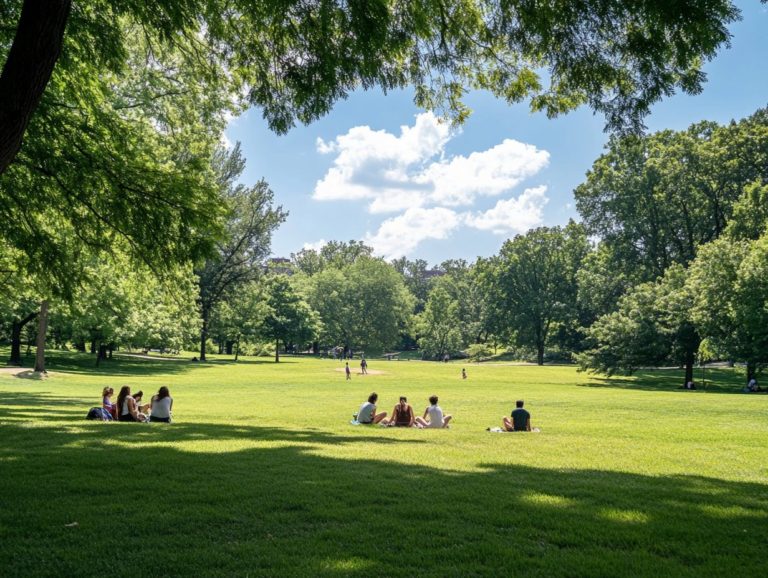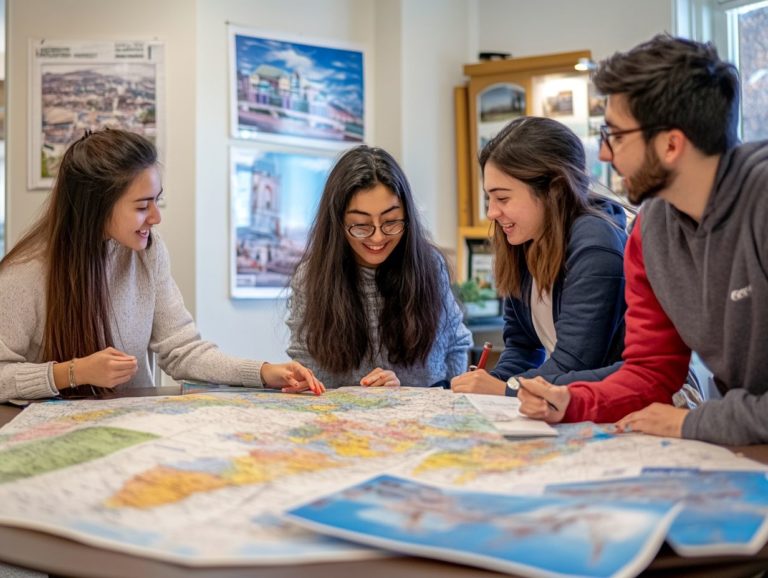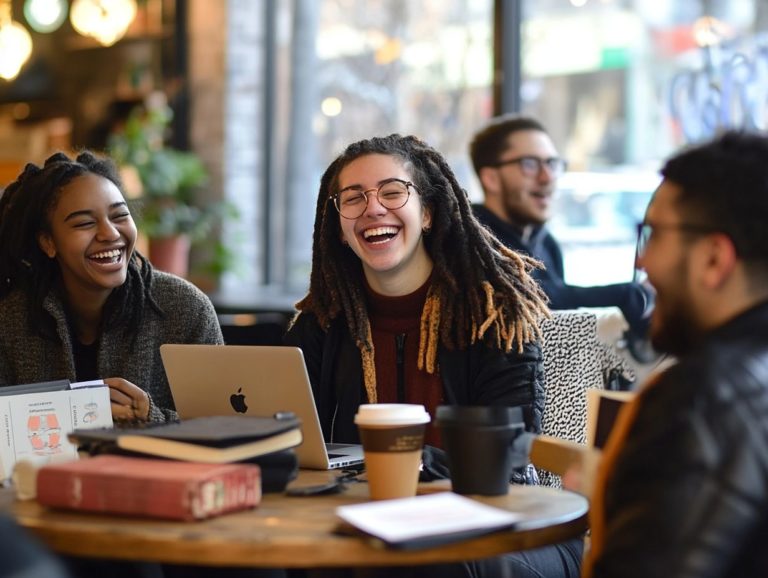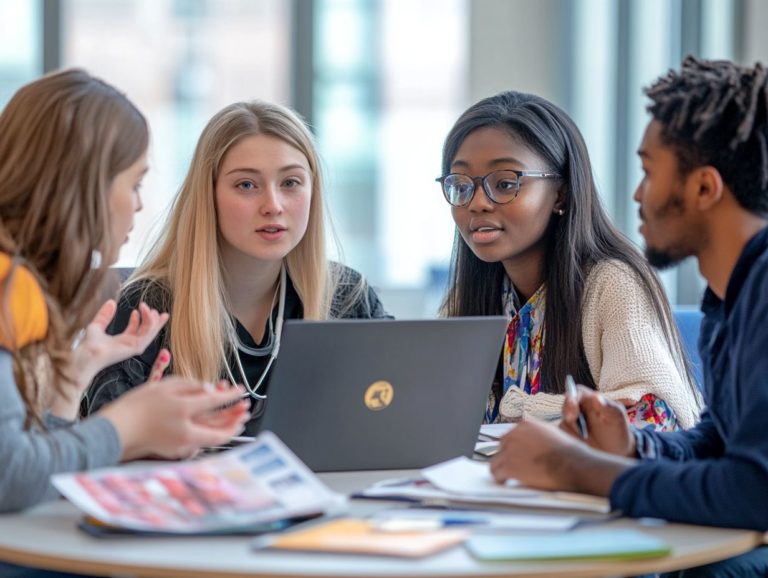Building Lifelong Friendships While Studying Abroad
Studying abroad is an exhilarating adventure. It provides not only opportunities for academic advancement but also chances to build meaningful friendships that may last a lifetime.
As you immerse yourself in a new culture, forming connections enriches your experience and creates a crucial support system in an unfamiliar setting.
Navigating cultural differences and language barriers can be challenging, but the rewards of forming friendships are immense. This article explores the benefits of building friendships during your time abroad, highlights common obstacles you may encounter, and offers effective strategies for nurturing these invaluable connections.
Contents
- Key Takeaways:
- Benefits of Making Friends While Studying Abroad
- Obstacles to Building Lifelong Friendships Abroad
- Strategies for Making Friends Abroad
- Maintaining Friendships After Studying Abroad
- Frequently Asked Questions
- 1. How can I build lifelong friendships while studying abroad?
- 2. Is it easy to make friends while studying abroad?
- 3. Can I maintain long-distance friendships after studying abroad?
- 4. Will language barriers affect my ability to make friends while studying abroad?
- 5. How can I make friends with locals while studying abroad?
- 6. What Are Some Things to Consider When Making Friends While Studying Abroad?
Key Takeaways:

- Building friendships enriches your understanding of local cultures.
- Friends provide essential support, making it easier to adapt.
- Joining clubs and activities helps you meet like-minded people.
Benefits of Making Friends While Studying Abroad
Making friends while studying abroad brings many benefits that truly enrich your experience. It enhances sharing cultures and personal growth, allowing you to enjoy local cuisines and traditions. Understanding the importance of networking while studying abroad can further elevate your travel experience.
By engaging with peers through shared interests or volunteering, you can build authentic friendships. Joining student organizations helps solidify these connections, creating an open-minded atmosphere that promotes learning and fosters lifelong friendships.
Enhanced Cultural Experience
One of the most significant benefits of making friends while studying abroad is the enhanced cultural experience. These friendships deepen your cultural understanding.
These relationships often blossom through shared adventures like trying local foods. Savor croissants and cr pes at a Parisian caf or enjoy a traditional Moroccan tagine in Rabat.
Engaging in community events, like the F te de la Musique in France or the lively Mawazine festival in Morocco, provides firsthand insights into each other s traditions and music. Such experiences foster a sense of belonging, helping you break down barriers and enrich your global perspective.
Ultimately, these friendships become a bridge for exchanging ideas and customs that nurture your personal growth.
Support System in a New Environment
Having friends around you makes everything easier! A support system in a new environment is invaluable for you as an international student. It helps you adjust to student housing, fosters personal growth, and encourages lifelong friendships.
Navigating a foreign culture can be overwhelming, but friends serve as your emotional anchor during moments of homesickness and uncertainty. They provide academic support through study groups and resources, making learning in a new educational system much simpler.
Reliable companions also simplify daily tasks like grocery shopping and figuring out public transportation, making everyday life more manageable. Social media allows you to share experiences and keep in touch with friends, whether they re nearby or miles away.
Moreover, networking with local students enriches your educational experience. They offer valuable insights into the community and share different perspectives that enhance your cultural understanding.
Obstacles to Building Lifelong Friendships Abroad
Studying abroad is undoubtedly a transformative experience, yet several obstacles may hinder your journey toward forming lifelong friendships. Cultural differences and language issues can make it hard to connect with others, but building a support system while studying abroad can greatly enhance your experience.
Cultural Differences

Cultural differences can profoundly influence your ability to forge friendships while studying abroad, often leading to misunderstandings that require a touch of open-mindedness for effective cultural appreciation.
Consider how communication styles shift from one culture to another; some individuals may come from backgrounds that embrace directness, while others lean toward more indirect cues or subtler forms of expression. In a classroom setting, you might misinterpret a peer’s silence as disinterest, when, in fact, it could simply reflect cultural norms of respect.
Social customs, such as greeting etiquette or gift-giving practices, can vary dramatically, making it crucial for you to approach new situations with curiosity instead of judgment. By nurturing an open-minded attitude, you can navigate these cultural nuances more adeptly, fostering connections that are rooted in mutual respect and shared experiences.
Language Barriers
Language barriers often stand as a significant hurdle for international students, impeding their ability to communicate effectively and forge meaningful global connections while studying abroad.
These challenges can evoke feelings of isolation and negatively impact academic success. Yet, language exchange programs provide a remarkable opportunity for you to enhance your language skills while simultaneously cultivating valuable friendships. By engaging in structured conversations with native speakers, you can boost your confidence and improve your fluency.
The importance of social media in this context cannot be overstated; it serves as a platform where you can connect with others, share experiences, and practice languages in a relaxed environment. This virtual interaction is essential for dismantling linguistic divides, allowing students from diverse backgrounds to discover common ground and support one another throughout their educational journeys.
Strategies for Making Friends Abroad
Implementing effective strategies to forge friendships abroad can greatly enrich your study experience. By engaging with clubs, organizations, and cultural activities, you can learn how to make friends while traveling abroad, cultivating connections that can lead to unforgettable shared travel adventures.
Joining Clubs and Organizations
Joining clubs and student organizations is an exceptionally effective way for you to make friends while studying abroad, offering you abundant networking opportunities and a strong sense of community.
These groups come in all shapes and sizes, from cultural and culinary clubs that celebrate diverse heritages to academic organizations centered around specific fields of study. By immersing yourself in these extracurricular activities, you not only acquire valuable insights and skills but also cultivate lasting relationships with peers who share your interests and backgrounds.
Social media platforms play a crucial role in connecting you to these clubs. With dedicated Facebook groups, Instagram pages, and online forums, you can effortlessly discover and reach out to potential organizations, making it much easier to forge friendships and seamlessly integrate into your new environment.
Participating in Cultural Activities
Participating in cultural activities while studying abroad is a remarkable opportunity for you to meet new people. It opens the door to exploring diverse cultures and discovering shared interests that can blossom into genuine friendships.
Engaging in local festivals whether it’s vibrant street fairs or traditional celebrations immerses you in customs and traditions that truly define the region.
Classes and workshops, from culinary arts to traditional crafts, not only hone your skills but also create a lively, collaborative environment where you can connect with others in a fun way.
Community service projects allow you to engage with local residents, contributing positively to the community while fostering a sense of belonging and mutual respect.
Through these enriching experiences, you can deepen your cultural understanding and form lasting connections, making your academic journey and personal growth all the more meaningful.
Maintaining Friendships After Studying Abroad
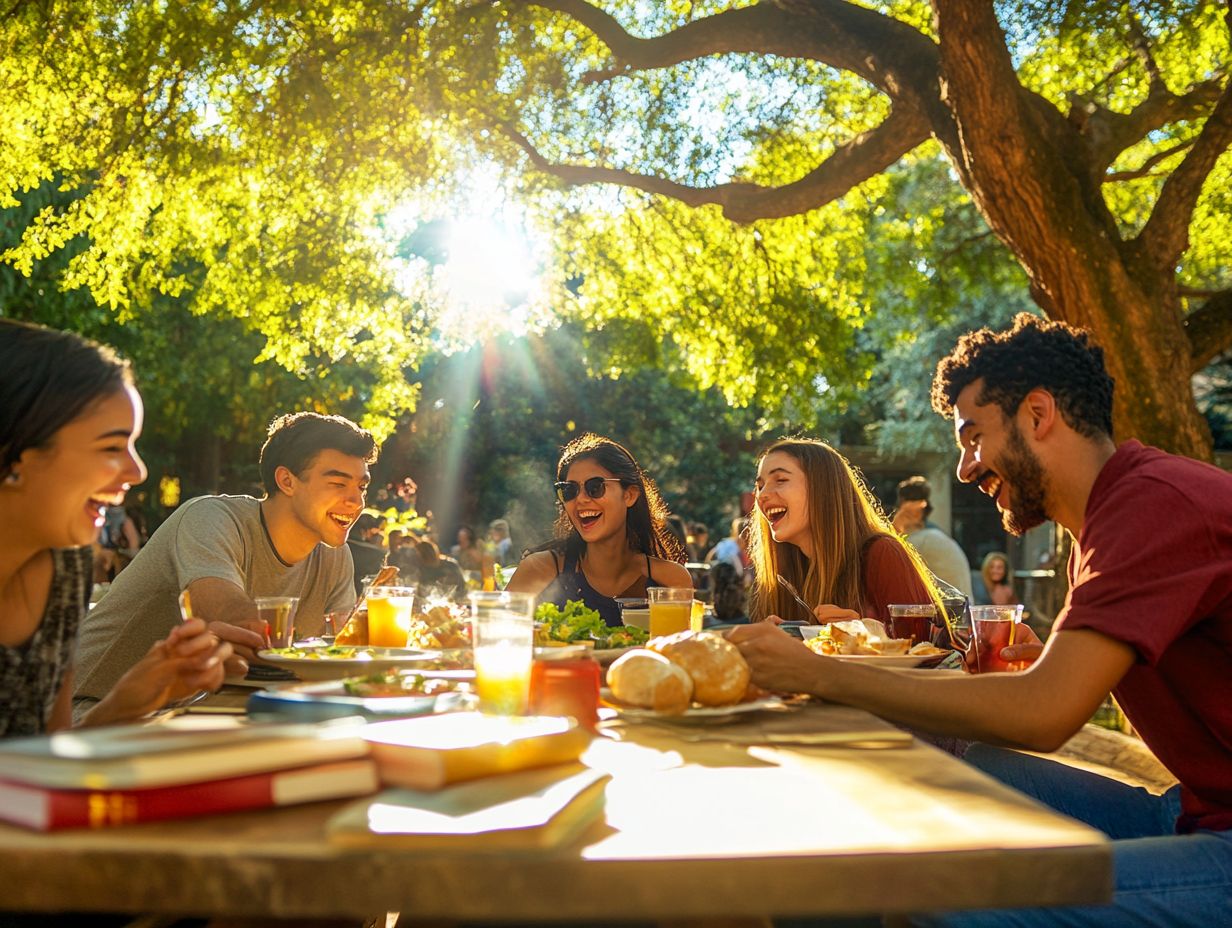
Maintaining friendships after studying abroad is essential for preserving valuable global connections and fostering lifelong relationships. To enhance your experience, consider exploring how to make the most of your study abroad experience—using technology is key to ensuring these bonds remain strong and vibrant.
Utilizing Technology to Stay Connected
Using technology is essential to stay connected with friends made during your study abroad experience. This allows those genuine friendships to flourish despite geographical distances.
In today s world, social media platforms like Instagram and Facebook let you share life updates in real time, making the gaps between continents seem to vanish. Video calling apps like Zoom and Skype allow you to see and talk to your friends, which is crucial for nurturing relationships.
Group chats on platforms like WhatsApp make it easy to communicate quickly, so you can plan get-togethers, share experiences, and support one another even when you re miles apart. By using these tools, you not only keep your friendships alive but also enrich them, creating shared memories and deepening emotional bonds.
Planning Reunions and Visits
Planning reunions and visits is a meaningful way to maintain friendships formed abroad. These gatherings create amazing opportunities for shared travel experiences and enriching cultural exchanges.
Such events can forge connections that transcend borders, creating lasting memories. For example, a group of college study abroad participants recently found a picturesque location to relive their adventures and dive into new cultures. They organized a reunion in Portugal, where they celebrated local traditions and shared their diverse backgrounds, effectively strengthening their bonds. This event not only rejuvenated their friendships but also deepened their appreciation for cultural nuances.
No matter if you re going on weekend trips to vibrant cities or hosting casual barbecues in familiar backyards, thoughtful planning can transform simple reunions into enriching experiences. Don’t miss out on these opportunities to reinforce the importance of enduring connections!
Frequently Asked Questions
1. How can I build lifelong friendships while studying abroad?
Building lifelong friendships while studying abroad requires effort to connect with others. Be open-minded and step out of your comfort zone! Joining clubs and organizations, attending events, and participating in group activities are great ways to meet and bond with fellow students. For more tips, check out this guide on how to make friends while studying abroad.
2. Is it easy to make friends while studying abroad?

Making friends while studying abroad can be a thrilling adventure, but it does come with its challenges! It may take time and effort to find your group of friends, but remember that everyone else is also in a new environment and looking to make connections. Understanding the importance of networking when studying abroad can greatly enhance your experience.
3. Can I maintain long-distance friendships after studying abroad?
Yes, it is absolutely possible to maintain long-distance friendships after studying abroad. Thanks to technology and social media, it’s easier than ever to stay in touch with friends from all over the world. Make plans to visit each other and keep the communication going to nurture your friendships!
4. Will language barriers affect my ability to make friends while studying abroad?
While language barriers may initially pose a challenge, they shouldn’t stop you from making friends while studying abroad. Many international students speak English as a second language and are eager to practice with native speakers. Plus, learning a new language can be a fun way to bond with others!
5. How can I make friends with locals while studying abroad?
Making friends with locals while studying abroad can be a rewarding experience! Get involved in the community by volunteering, attending cultural events, or participating in language exchange programs. Additionally, learning how to stay connected while studying abroad can help you show interest in their culture and customs, which can break the ice and form meaningful friendships.
Stay connected, plan your visit, and make those friendships last!
6. What Are Some Things to Consider When Making Friends While Studying Abroad?
Be open-minded and respectful of different cultures when making friends. Embrace new experiences and meet new people.
It’s also vital to take care of your mental and physical health. Don’t hesitate to try new activities to expand your social circle.
Finally, stay in touch with your friends after your study abroad adventure ends. These connections can enrich your life long after your trip is over, highlighting the importance of networking in study abroad experiences!

